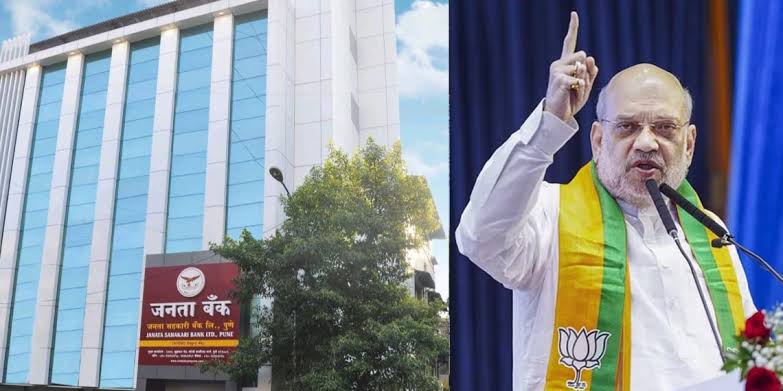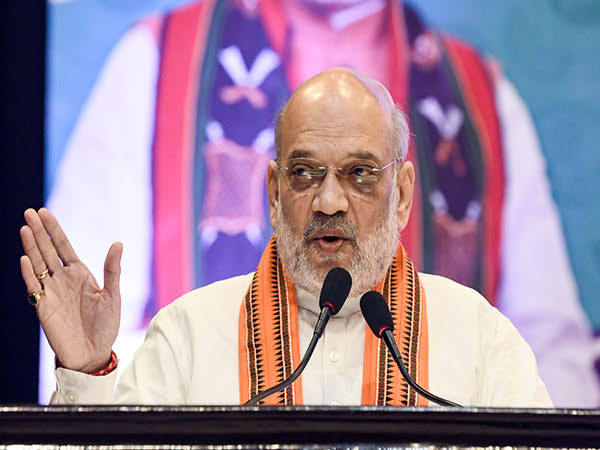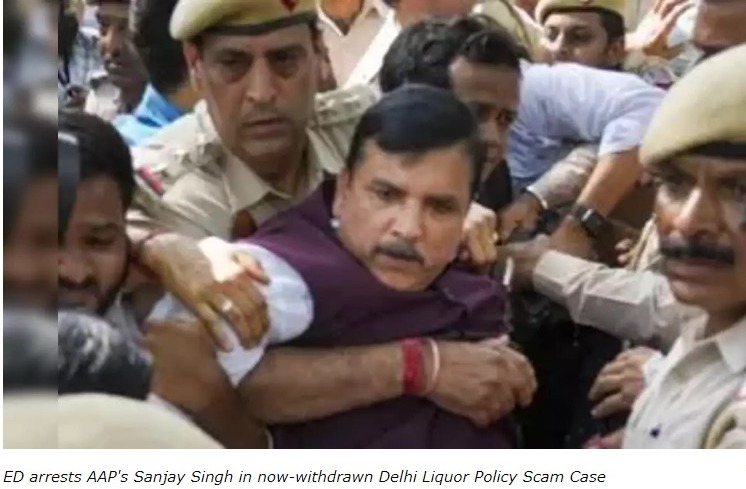Union Home Minister and Minister of Cooperation, Shri Amit Shah, addressed the valedictory function of the Diamond Jubilee celebrations of Janata Sahakari Bank Limited in Pune, Maharashtra. The event witnessed the presence of Union Minister of State for Cooperation, Shri Murlidhar Mohol, along with several distinguished dignitaries, including Maharashtra Chief Minister Shri Devendra Fadnavis and Deputy Chief Ministers Shri Eknath Shinde and Shri Ajit Pawar.
 During his address, Shri Amit Shah praised the remarkable journey of Janata Sahakari Bank, which was founded by the esteemed thinker and RSS worker, Shri Moropant Pingale. What started as a small initiative has now evolved into a massive financial institution, connecting over 10 lakh people. He emphasized that the success of Janata Sahakari Bank stands as a testament to the strength of cooperative values and the transparent and dedicated functioning of the institution.
During his address, Shri Amit Shah praised the remarkable journey of Janata Sahakari Bank, which was founded by the esteemed thinker and RSS worker, Shri Moropant Pingale. What started as a small initiative has now evolved into a massive financial institution, connecting over 10 lakh people. He emphasized that the success of Janata Sahakari Bank stands as a testament to the strength of cooperative values and the transparent and dedicated functioning of the institution.
Highlighting the importance of the cooperative sector, Shri Shah reiterated Prime Minister Shri Narendra Modi’s vision of making India a fully developed nation by 2047 and achieving a $5 trillion economy by 2027. He stressed that these goals would be incomplete without the empowerment and expansion of the cooperative movement. By ensuring that every citizen has access to opportunities for growth, the cooperative sector plays a crucial role in national development.
Shri Shah underscored the motto of the Ministry of Cooperation, ‘Sahakar se Samriddhi,’ meaning ‘Prosperity through Cooperation.’ He stated that under Prime Minister Modi’s leadership, numerous basic facilities have been extended to millions of citizens, and now they aspire to contribute to national progress. Cooperation, he affirmed, is the only way individuals can collectively generate capital and drive economic prosperity. Janata Sahakari Bank, he said, has embodied this spirit, proving itself as a ‘big bank for small people.’
The Union Minister also highlighted the Modi government’s focused efforts on strengthening the cooperative sector over the past three years. He noted that India’s cooperative model has been made market-friendly, and a Cooperative University Bill is in the works to educate and train youth in cooperative practices. The government is committed to fostering cooperative innovation as a means to accelerate national growth.
Shri Shah spoke about the importance of embracing modern technology within the cooperative sector. With 1,465 urban cooperative banks in India, of which 460 are in Maharashtra, the establishment of the National Urban Co-operative Finance and Development Corporation (NUCFDC) has been a major step. The government has already mobilized Rs. 300 crore for this initiative, which aims to provide necessary support to cooperative banks. Furthermore, for the first time, a cooperative clearing house has been conceptualized, and its implementation is expected to be completed within the next two years.
The Union Minister also mentioned several reforms introduced by the Modi government to enhance urban cooperative banks. These include the Aadhaar-enabled payment system, increased limits for gold and housing loans, and a provision for one-time loan settlements. He emphasized that after the formation of the umbrella organization, all clearing processes for cooperative banks will be conducted within the cooperative banking system itself, strengthening their autonomy and financial sustainability.
Shri Amit Shah reflected on the legacy of Janata Sahakari Bank, which was established in 1949, became a scheduled cooperative bank in 1988, adopted core banking in 2005, and achieved the status of a multi-state scheduled cooperative bank in 2012. The bank has also been a pioneer in establishing the country’s first cooperative demat institution. With 71 branches, two extension counters, 1.75 lakh members, and over 10 lakh satisfied customers, Janata Sahakari Bank is more than just a financial institution—it is a symbol of cooperative success and community welfare.
He concluded by acknowledging the bank’s consistent role in social service, from providing relief during the Latur earthquake and Kolhapur-Sangli floods to extending aid during the COVID-19 pandemic. Today, the bank holds deposits exceeding ₹9,600 crore, a clear indication of the trust and confidence people place in it. Shri Shah expressed his confidence that, under the continued leadership of dedicated individuals and the cooperative spirit, Janata Sahakari Bank will continue to set benchmarks in cooperative banking and contribute to India’s economic prosperity.




